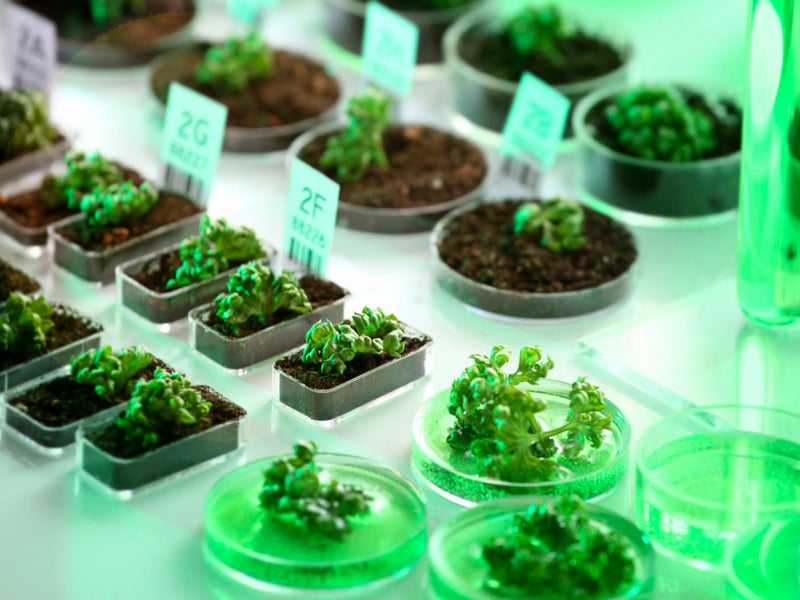Don’t Be Afraid to Challenge Industry ‘Science’ on GE Foods
Questioning the safety of pesticides and genetically engineered crops isn’t “anti-science,” no matter what agribusiness says.

This page was published 10 years ago. Find the latest on Earthjustice’s work.
Have you noticed that the latest tactic to discredit anyone who doesn’t buy into a corporate claim that a product is safe is to label the person “anti-science?” If you try to get better regulation of pesticide use around schoolchildren or farmworkers, you’re not prudent, you’re “anti-science.” Don’t care to have genetically engineered products on your dinner table while companies fight every attempt to label them so you have a choice? They’re happy to label you “anti-science,” too.
Such challenges to industry hype are now dismissed as ignorant hysteria, along with the belief in a flat earth or aliens building the pyramids. Legislators seeking cover for their industry-friendly votes declare they’re just following “the science.” Celebrities who popularize science on television weigh in on matters they know nothing about, as though having a degree in any field of science makes them an expert in all of them. Even journalists who aspire to uncover the truth behind a controversy seem eager to jump on this bandwagon to avoid being accused of “anti-science” bias.
Friends of the Earth
These are the top 5 food and agricultural industry front groups that influence what the public and policymakers think about food. Source: Spinning Food, Friends of the Earth
The irony is that this science fetish is the opposite of science-based. Science is a system for acquiring knowledge by testing hypotheses with experiments. Any claim must be supported by experiments carefully designed to minimize the possibility of bias or false conclusions. A poorly designed study will prove far less than it might appear, which is why scientific journals use experts to peer review articles before publishing. This is also why theories explaining the natural world that were long accepted by scientists as fact have been discarded as better experiments prove them wrong.
So anything not supported by a well-designed experiment is at best speculation, or at worst, propaganda packaged and sold to those fearful of appearing “anti-science.” Of course, we now know that tobacco companies intentionally manipulated data for decades to conceal their products’ impacts, all the while using ads featuring doctors in white coats to sell cigarettes. Drug companies have paid billions in fines for misleading the public. Yet when a company that manufactures a genetically engineered product or a pesticide declares “the science shows this is safe,” and a spokesperson with a Ph.D.—and a financial tie to the industry—denounces all who question the claim, some still fail to think critically or to look at the study that supposedly supports this opinion.
It’s now become all too easy to publish studies that a discerning reader knows prove little or nothing. Richard Horton, editor of the prestigious medical journal The Lancet, recently wrote:
“Much of the scientific literature, perhaps half, may simply be untrue. Afflicted by studies with small sample sizes, tiny effects, invalid exploratory analyses and flagrant conflicts of interest, together with an obsession for pursuing fashionable trends of dubious importance, science has taken a turn towards darkness.”
There’s an enormous difference between having been proven safe and not yet having been proven harmful, yet many people confuse the two. Monsanto for many years touted Roundup as safe, but had it been proven safe, the World Health Organization could not have recently classified it as “probably carcinogenic to humans.”
Similarly, despite claims that “GMOs are safe to eat,” there is no scientific basis for this claim. The FDA neither tests genetically modified foods nor has ever approved one as safe for human consumption. The agency merely reviews voluntarily submitted studies financed or conducted primarily by biotechnology companies and confirms that the companies have made safety determinations. In fact, non-industry scientists often cannot conduct studies in the United States because industry has restricted the use of patented GM crops in food safety research. There have been no long-term or epidemiologic studies in the U.S. demonstrating that genetically engineered foods are safe for human consumption, but plenty of laboratory studies suggesting they might not be, along with extensive evidence of their environmental impacts. Nor is there any consensus about their safety in the scientific community.
Uncritically accepting an assertion about “the science” isn’t scientific, it’s faith in a corporation’s public relations department. As Stephen Hawking noted, “The greatest enemy of knowledge is not ignorance, it is the illusion of knowledge.”
Established in 1988, Earthjustice's Mid-Pacific Office, located in Honolulu, Hawaiʻi, works on a broad range of environmental and community health issues, including to ensure water is a public trust and to achieve a cleaner energy future.